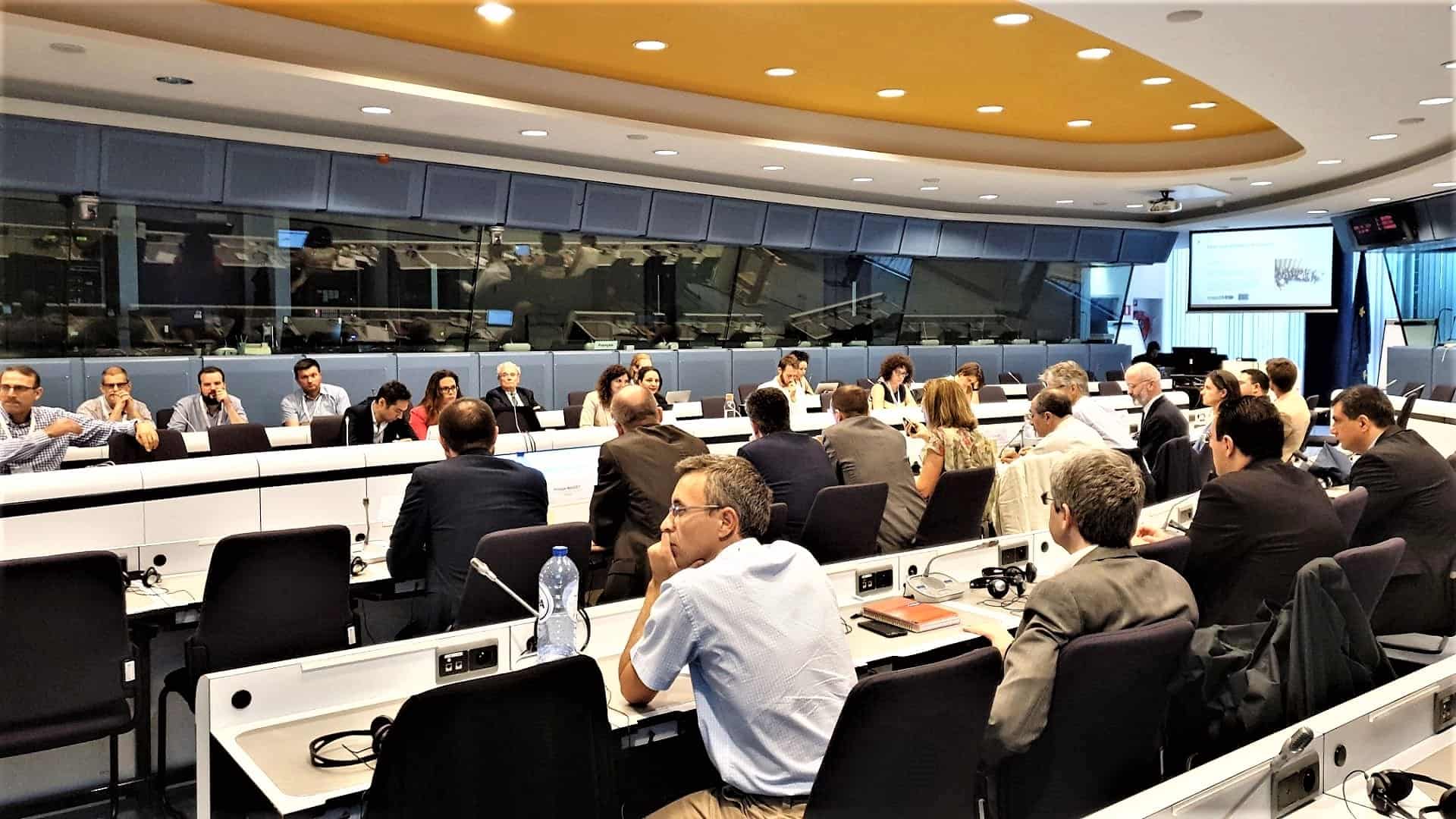On 19 June 2019, the meetMED team took part in the event co-organised by MEDENER and EUROMED Cities Network in the framework of the European Sustainable Energy Week 2019 in Brussels. Moderated by Mr Matteo Barra, meetMED Project Manager, the event explored the “Role of Local Authorities and National Agencies for Efficient Buildings in the Mediterranean region” and focused particularly on the possible ways to scale-up and foster innovative tools for energy efficient buildings. The debate among the panellists has been trigged after the lack of political commitment was identified by the public in the room as the main missing element to foster energy transition in the building sector. The panellists reacted to the provocative outcome of the poll by presenting diverse initiatives to tackle the problem at different governance levels. By opening the debate, representatives from the European Commission, the Union for the Mediterranean and MEDENER presented the initiatives taken in the Mediterranean region at the supranational level. Firstly, Mr Eero Ailio, Adviser on Energy Transition and Local Governance at the DG Energy of the European Commission, emphasised the key role local authorities play – particularly when grouped in networks, like the Covenant of Mayors – to ensure that EU and national policies have an effective impact on the ground. The Senior Deputy Secretary General for Energy and Climate Action of the Union for the Mediterranean, Mr Jorge Borrego, stressed the importance of energy transition as an effective way to act against climate change. He continued by acknowledging the role the meetMED Project is playing on the matter especially through the work carried out by its task forces of experts on EE in Buildings and EE in appliances. Particular attention has been given also to the process of the refurbishment of existing buildings, often overshadowed as, most of the times, the owners of the buildings requiring renovation are not their actual users. The Secretary General of MEDENER, Ms Roberta Boniotti, gave an overview of the work carried out by Association in the field, including the activities carried out by 8 out if its 13 members in the framework of the meetMED project with the aim of putting energy efficiency and renewable energy at the heart of public policy making in the countries of both the Northern and Southern shores of the Mediterranean. Ms Boniotti highlighted the importance of raising public authorities’ awareness with respect to the feasibility of investments in the EE and RE sectors. Likewise, the Secretary General of EUROMED Cities Network, Mr Bernard Massabo, shed the light on the relevance of creating synergies in the whole Mediterranean area, which may trigger the replication of good practices. Particularly, he mentioned the activities EUROMED Cities is implementing in the framework of the INTERREG programme.
The panel discussion addressed the topic of innovative tools for energy efficient buildings from a more local perspective, thus providing very practical examples. Mr Evangelos Evangelides, Mayor of Aradippou (Cyprus), stressed the importance of informing the citizens about the incentives and policies in force at the municipal level to make buildings more energy efficient. Particularly, he described the initiative of the reward cards implemented by his Municipality – where citizens accumulate points for any EE measures implemented, equivalent to a tax reduction of the same amount – and the pilot action plan for the zero production of household waste, in force by September 2019. Ms Claire Roumet, Executive officer of Energy Cities, contributed to the debate by emphasizing the key role played by innovative technological tools, like ECOLOCAL – a mobile App tracking energy consumption in the different buildings – and by projects targeting reduction of energy consumption in schools, where pupils have the right and the responsibility to choose how to invest savings coming from reduced energy consumption in their schools. Mr Pier Luigi Porta, Researcher at ENEA, presented the TEESCHOOLS project, which provides new solutions to Local Authorities both in technical and financial terms to implement Nearly Zero Energy Building (NZEB) renovation activities in Mediterranean schools, thus raising awareness also among the youngest generations. These initiatives have shown that children pay more attention to the issues relating to energy transition and climate change compared to their parents, who, thanks to them, learn to act more responsibly on these matters. Mr Philippe Masset, Deputy Director of the Europe and International Division at ADEME, and Mr Radouan Yessouf, Head of Energy Efficiency in the BuildingDivision at AMEE, provided, then, concrete examples of measures implemented by national energy agencies from two Mediterranean countries. Mr Masset illustrated the actions implemented by ADEME in the framework of the broader French multilevel governance system, which intertwines national initiatives on energy efficiency with the regional ones. For instance, ADEME, in cooperation with the Regional Council of Ile de France, created a private-public company to help financing energy consumption reduction measures and overcome the barriers to investments in the sector. Furthermore, a Regional Council made up of 17 French regions, established a dedicated platform for energy efficiency renovation in buildings, which is meant to train all the stakeholders involved in the sector and to make investments more effective on people’s lives. Likewise, Mr Yessouf presented the main measures implemented in Morocco, where the building sector is one of the most energy-intensive sectors. All EE policy measures need for strong financial incentives from the public institutions, especially in the first years of their implementation. Among other incentives, Morocco decided to exempt imports of EE materials from VAT and other custom tariffs as well as to help Moroccan private companies through the Programme MorSEFF, supported by the European Union. In addition, Morocco managed to support its national energy transition thanks to an initiative aimed at modernising energy systems in mosques and other public buildings and at creating new jobs: The Green Mosques and Buildings Project, which was initiated in 2014 by the Ministry of Energy and the Ministry of Religious Affairs in cooperation with SIE, the Moroccan state energy investment company, and AMEE.


